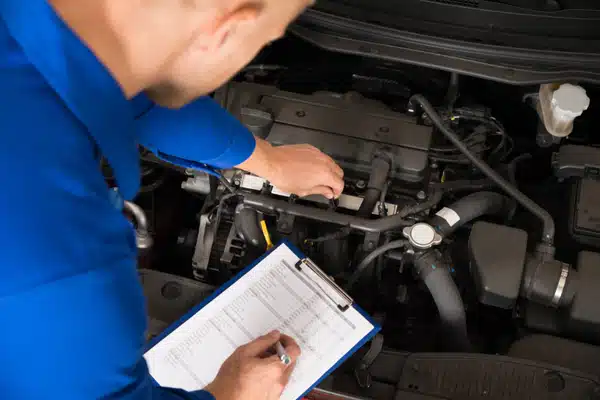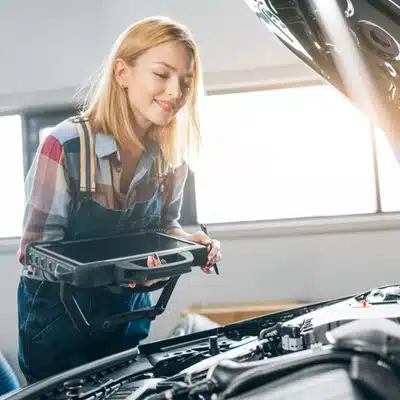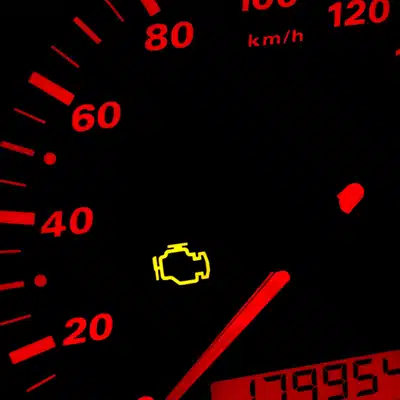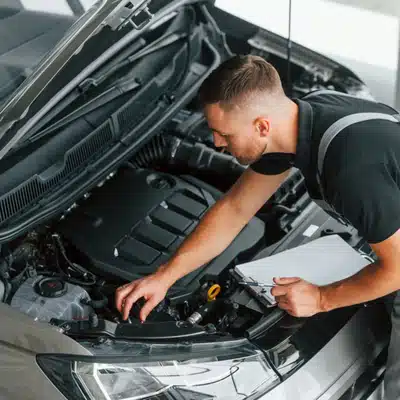Weekdays 8:00am-5:00pm Sat Closed Sun Closed

Your VW has a smart computer system that watches everything. When something breaks, the car logs it and turns on a warning light. That check engine light on your dash means your car needs help. This guide shows you how diagnostics work and when to get your car checked.

Modern VWs use OBD technology to watch their own health. The OBD system checks all major parts constantly. When a sensor finds a problem, your engine control module stores an error code. The ECM is your car's brain. It runs fuel injection, timing, and other key tasks.
Your VW has many control units beyond just the engine control module. These control units manage brakes, airbags, locks, and more. Each one watches its own area. When things go wrong, they save fault codes in their fault memory. Your dashboard warning lights tell you about these stored problems. Each control unit monitors specific systems in your vehicle.
The OBD2 system became standard in all cars after 1996. Your VW has a 16-pin port under the dash. This port lets diagnostic equipment talk to your car's computer. The OBD2 connection makes vehicle diagnostics possible for any shop with the right scanner.
A fault code is just a number and letter combo. P0101 means one thing. P0420 means another. These trouble codes point to specific issues. But one code doesn't always tell the full story. These error codes are clues that help with troubleshooting. That's why good shops use more than just basic scanners for fault diagnosis.
Your VW stores these diagnostic trouble codes every time a control unit spots an issue. Maybe your emissions system acts up. Maybe a sensor fails. A scanner pulls these codes from the fault memory during a system scan. Understanding these error messages helps techs fix your vehicle problems fast. The second set of error messages might reveal deeper issues.
Shops use a diagnostic device to read your car's stored problems. You might hear it called a scanner or scan tool. This diagnostic device plugs into your OBD port. Once connected, the diagnostic device talks to all your control units through a diagnostic protocol.
The diagnostic device uses special communication protocols. Older VWs used KWP2000 as their main diagnostic protocol. Newer models use UDS for better data exchange. These protocols let the diagnostic device and your ECU exchange data. The scanner asks questions. Your car's computers answer with codes and live data. Every diagnostic device needs these protocols to communicate properly.
When a tech scans your VW, the diagnostic tool contacts each control unit. It asks if any faults exist. Each unit reports back from its fault memory. This data retrieval happens fast. The diagnostic software shows everything on screen during the diagnostic operation.
But good vehicle diagnostics go beyond just reading codes. A diagnostic device can watch live sensor data. It can test parts. It can even log info while you drive to catch random problems. This helps techs understand what's really happening in your car.
VW dealers use a system called ODIS. That's short for Offboard Diagnostic Information System. ODIS is factory diagnostic software designed just for VW group cars. The ODIS system connects through a vehicle communication interface called a VCI.
The VCI is the hardware link between your car and the computer. This VCI device gives techs full access to every part of your car. VW uses advanced VCI units for professional diagnostics. The ODIS system can do things basic diagnostic equipment can't handle. Every VCI connects to the ODIS software for complete access.
ODIS doesn't just read codes. It guides techs through fault finding step by step. The ODIS software connects to VW's diagnostic procedures database. This gives access to workshop manuals and service bulletins. It's like having the factory repair guide built in for every diagnostic device operation.
When your check engine light comes on, the ODIS system can dig deeper than generic tools. A basic diagnostic device might say "EGR problem." But the second ODIS system will guide the tech through specific diagnostic tests. It checks valves, sensors, and passages using detailed procedures. This finds the real cause fast through proper diagnostics.
The ODIS software also does special jobs. It can code new parts. It can update engine management software. It can program control units after repairs. Only factory-level diagnostic equipment can do this properly through the advanced diagnostic system.
You can buy your own scanner. Many people do. These aftermarket diagnostics tools work fine for basic diagnostic checks. They read OBD codes through the OBD port. They clear your check engine light. They show live data through the OBD connection.
But they have limits. VW keeps some functions locked. Only factory scan tools get full access. An aftermarket scanner in basic mode can't reach deep fault memory. It can't run advanced procedures. It can't access all control units the way proper diagnostic equipment does.
Some aftermarket VW-specific tools exist. VCDS and OBDeleven are popular among DIY owners. But they still need you to know what you're doing. You have to read workshop manuals yourself. You need to understand what the codes mean.
A good shop combines the right diagnostic equipment with real knowledge. Techs know how to read diagnostic reports correctly. They understand service bulletins that VW issues. These bulletins tell dealers how to fix known issues found through proper checks.
When you bring your VW in, experienced techs check for relevant bulletins. They know what vehicle problems affect your model year. They can spot patterns in fault memory. This kind of fault diagnosis can't happen with just a diagnostic device and hope. Professional tools make accurate repairs possible.
Don't wait when your car tells you something's wrong. Here's when to schedule vehicle diagnostics right away.

This is the big one. Your check engine light means the OBD system found a problem. The light looks like a small engine icon. Don't mix it up with the oil light or other warning lights.
The car has stored fault codes in fault memory waiting to be read by a diagnostic device. Even if your VW drives fine, get diagnostic checks done. Sometimes it's simple. A loose gas cap can trigger the light. But sometimes it's serious. You can't know without proper checks using a diagnostic device.
Try tightening your gas cap first. Click it shut firmly. Drive for a day or two. If the light stays on, book service. If the light blinks while driving, that's urgent. A flashing light means stop driving now.
Your car might run rough without turning on lights. Maybe it stalls. Maybe it hesitates. These are all signs that need attention right away.
The ECU might have logged codes even if the light didn't come on yet. Some faults need to happen multiple times before they trigger lights. Getting checks early can prevent bigger issues. Small problems grow into expensive ones.
Always get checks done on any used car before buying. A quick scan reveals hidden codes. The seller might have cleared codes to hide problems. But some codes come back fast. Others stay in history.
You want to check all control units, not just the engine. Have a shop pull data from the transmission, ABS, airbags, and more using their diagnostic device. This complete vehicle diagnostics check protects you from buying someone else's problem. The diagnostic device will reveal everything stored in memory.
Even if nothing seems wrong, periodic scans help. Many shops include a basic scan with oil changes. This catches small issues before they grow. The car might have stored minor codes that haven't triggered lights yet.
Think of it like a checkup at the doctor. You don't wait until you're sick. Prevention saves money and stress.
Expert Care for Your Volkswagen
Good independent VW shops invest in the same tools dealers use. They have ODIS and proper VCI hardware. They can access the full system for complete fault memory reads and accurate data retrieval.
Techs who focus on VW know the common problems. They've seen your car's issues before and know which diagnostic tests to run first. This experience cuts time and means lower labor costs for you.
Modern cars need software updates just like phones. Only shops with the right tools can install these updates through the system. Factory tools handle coding through the proper communication protocol.
Getting thorough vehicle diagnostics gives you confidence. You know what's wrong and it's fixed right. Catching problems early protects other parts and prevents costly chain reactions.
You have choices for where to take your car. Here's why a VW specialist matters for good checks.
Good independent VW shops invest in the same tools dealers use. They have ODIS and proper VCI hardware. They can access the full system. This means complete fault memory reads. This means accurate data retrieval from all units using professional tools.
Without these factory scan tools, shops are guessing. With them, they're working from VW's own playbook. The difference shows in repair accuracy and speed with proper work using the right diagnostic device.
Techs who focus on VW know the common problems. They've seen your car's issues before. They know which diagnostic tests to run first. They understand the quirks of different models through experience with vehicle diagnostics.
This experience cuts time. Less time means lower labor costs. It also means better repairs using accurate reports the first time around.
Modern cars need software updates just like phones. VW releases updates for control units regularly. These might fix false messages. Only shops with the right tools can install these updates through the system using their diagnostic device.
When you replace a unit, it needs coding. The new part has to learn your car's setup through the VCI. Factory tools handle this through the proper communication protocol. Basic scanners can't do it.
Getting thorough vehicle diagnostics gives you confidence. You know what's wrong. You know it's fixed right. You're not wondering if something got missed.
Catching problems early also protects other parts. Small faults can damage expensive parts over time. Proper work prevents this chain reaction.
Car tech keeps changing. Electric and hybrid VWs are everywhere now. The ID.4 and other EVs still need checks through their OBD ports. But the focus shifts from engine codes to battery and motor systems.
Electric cars don't use traditional OBD the same way. They rely more on UDS and other advanced protocols through their diagnostic device connections. Taking your EV to a shop with updated software matters. The tools need to talk to battery controllers and power systems using the right VCI.
The good news? The process feels the same to you. Plug in the diagnostic device. Read the codes. Fix the issue. Behind the scenes, the tools have evolved for new tech and new units.
VW is also adding more connected features. Cars can report some issues remotely now. But when real problems happen, you still need a physical scan and repair with proper tools using a diagnostic device.
Tools get updated multiple times each year. New models need new software. New codes get added. Shops that stay current with their tools can handle any VW, old or new.

Your VW talks to people who know how to listen. Lights are its way of asking for help. When you see a light or feel something wrong, that's your signal to act.
Getting checks quickly saves money. Small problems stay small. Ignored problems grow into failures. A cheap sensor fix becomes an expensive engine repair if you wait.
At Europe Services Auto, we focus on VW and European brands. We have factory-level tools including ODIS and professional VCI devices. Our techs know VW inside and out. We can read simple codes or handle complex updates to your ECU. Whatever your car needs, we've got the tools and skills to help.
Our independent shop offers the same system as dealers. But we add personal service and fair pricing. When lights come on, or any warning appears, call us. We'll get your VW scanned and fixed right with our diagnostic device. Don't let small problems turn into big ones. We use the latest diagnostic device technology to find issues fast.
Our techs perform thorough diagnostic tests on every car. They check every unit and every sensor. They look at live data and stored codes. This complete approach catches everything. Your second diagnostic device check confirms the first results. We believe in double-checking our work.
When we finish, you get clear answers. We explain what's wrong in plain terms. We show you the diagnostic device results. We give you options for repairs. You decide what makes sense for your budget. We never push unnecessary work.
Schedule your appointment today. Call Europe Services Auto now to keep your VW running strong.
Most shops charge between $100 and $150 for a full scan. This includes reading all units and providing detailed reports. Some places offer free scans but might not use factory-level tools. A proper scan with the right diagnostic device and expert review is worth paying for. You get accurate results and clear answers about what needs fixing.
It depends on the problem stored in fault memory. A steady light means you can usually drive to a shop safely. But don't wait long to get work done. If the light blinks, stop driving immediately. A flashing light signals serious damage happening right now. Pull over and get a tow to avoid making things worse.
Yes, but this doesn't fix anything. The codes will come back if the problem still exists. Clearing codes without repairs just hides the issue temporarily. Modern tools can see code history anyway. Save yourself the trouble and get proper work done instead using a diagnostic device. Real fixes solve real problems.
No. Independent VW specialists have the same software and tools that dealers use through proper VCI connections. They can perform identical diagnostic tests and repairs. Many owners prefer independent shops for better service and lower prices. Just make sure they have proper VW-specific tools and access to the database, not just basic scanners or a generic diagnostic device. Good independents invest in factory equipment.


